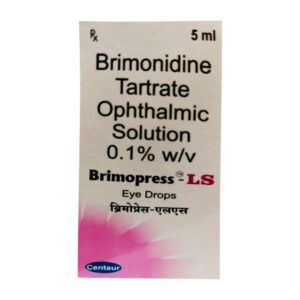BENZALKONIUM CHLORIDE + BRIMONIDINE + POLYVINYL ALCOHOL
Benzalkonium Chloride: Benzalkonium Chloride is a quaternary ammonium compound that is commonly used as a disinfectant and antiseptic. It is also found in various consumer products such as soaps, skin cleansers, eye drops, and nasal sprays.
The primary purpose of Benzalkonium Chloride is to kill or inhibit the growth of bacteria, viruses, and fungi. It achieves this by disrupting the cell membranes of microorganisms, which leads to their destruction. This mechanism of action makes it an effective agent for sanitizing and cleaning surfaces, as well as preventing infections in wounds.
The drug is available in various forms, including solution, gel, or ointment. The concentration of Benzalkonium Chloride can vary depending on the product and its intended use. For example, in disinfectants and antiseptics, it is typically found in concentrations ranging from 0.1% to 0.2%.
The common uses of Benzalkonium Chloride include:
1. Disinfecting and sanitizing surfaces in hospitals, clinics, and households.
2. Antiseptic for minor wounds, cuts, and abrasions.
3. Eye drops for cleaning and disinfecting contact lenses.
4. Nasal sprays for relieving nasal congestion and sinus symptoms.
When applying Benzalkonium Chloride as an antiseptic or disinfectant, it is important to follow the instructions provided by the manufacturer or healthcare professional. Typically, the drug is applied topically by directly applying the solution, gel, or ointment to the affected area.
While Benzalkonium Chloride is generally considered safe when used as directed, it can cause some side effects such as:
1. Irritation and redness at the application site.
2. Dryness or itching of the skin.
3. Allergic reactions, including rash or hives, which are rare but possible.
It is important to note that some individuals may be more sensitive to Benzalkonium Chloride than others. If any severe or persistent side effects occur, it is advised to seek medical attention.
Overall, Benzalkonium Chloride is an effective disinfectant and antiseptic that is widely used in various products. However, it is essential to use the drug as directed and be aware of any potential side effects.
Brimonidine: Brimonidine is a medication primarily used to treat open-angle glaucoma or ocular hypertension. It is available in the form of eye drops.
The main mechanism of action of Brimonidine is to decrease the production of aqueous humor (the fluid produced inside the eye) and increase its outflow, thereby reducing intraocular pressure (IOP). It achieves this by selectively activating alpha-2 adrenergic receptors located on the ciliary epithelium, leading to a decrease in the production of aqueous humor.
The usual recommended dose of Brimonidine is one drop in the affected eye(s) twice daily, approximately 12 hours apart. It is important to follow the dosage instructions provided by the healthcare professional and not exceed the prescribed dose.
Common side effects of Brimonidine may include burning or stinging sensation in the eyes, conjunctival hyperemia (redness or bloodshot appearance of the eye), itching, dry mouth, blurred vision, foreign body sensation, and ocular allergic reactions. Some less common but more severe side effects may include allergic reactions (swelling, rash, hives, difficulty breathing), eye pain, increased sensitivity to light, and changes in heart rate or blood pressure.
It is important to inform the healthcare professional about any other medications being taken, as drug interactions may occur. Brimonidine may interact with certain medications, including MAO inhibitors, antidepressants, high blood pressure medications, and some sedatives.
It is advisable to consult a healthcare professional or eye specialist for complete and personalized information about the use, dosage, and potential side effects of Brimonidine.
Polyvinyl Alcohol: Polyvinyl Alcohol (PVA) is a synthetic polymer that is commonly used as an eye lubricant or moistening agent. It is available in eye drops or artificial tears form and is primarily used to relieve dryness and irritation of the eyes.
The main mechanism of action of Polyvinyl Alcohol is to provide lubrication and ensure proper moisture retention on the surface of the eye. It forms a protective film over the cornea, reducing friction and preventing excessive tear evaporation.
The typical recommended dose of Polyvinyl Alcohol eye drops is one to two drops in each affected eye as needed. However, the actual dosage may vary depending on the severity of the dryness and the instructions provided by a healthcare professional.
Polyvinyl Alcohol eye drops are generally well-tolerated, and side effects are rare. However, some potential side effects that may occur include eye irritation, burning or stinging sensation, blurred vision, and temporary changes in visual acuity. If any of these side effects persist or worsen, it is advisable to consult a doctor.
It is worth noting that Polyvinyl Alcohol should not be used if an individual has an active infection in the eye or is allergic to any of the ingredients. It is always recommended to discuss any concerns or potential drug interactions with a healthcare professional before initiating the use of Polyvinyl Alcohol eye drops.

